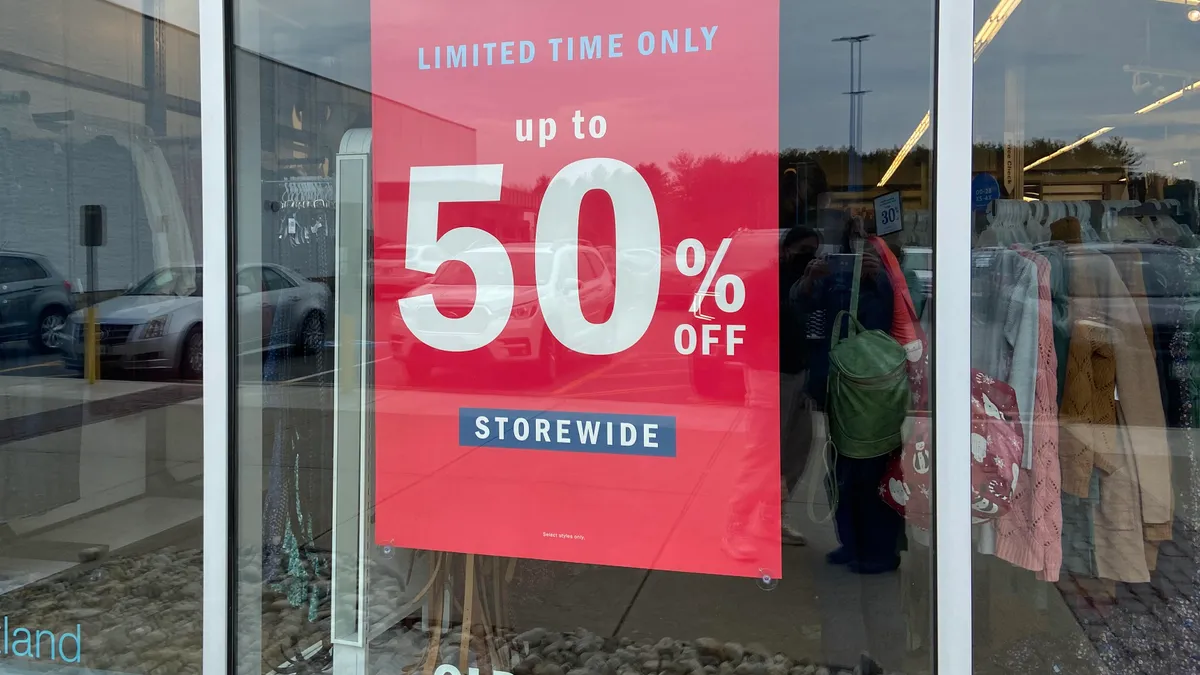Retailers are heading into the home stretch of a holiday season that remains unsettled by the ongoing pandemic, but this year, vaccinations have made it possible for consumers to gather, celebrate — and shop.
As they do, they're not finding the kind of deals they may be accustomed to this time of year, and that was true even for Black Friday and Cyber Monday.
During the red-letter days, for example, promotions were more shallow and harder to find at many stores, according to several reports. On Thanksgiving Day in the U.S., the average discount was 27%, down 7% from last year, with the average order value up 11%, despite the fact that 3% fewer items were purchased, according to a research from Salesforce. From Nov. 23 to Nov. 25, the average selling price in the U.S. was up 22% compared to the same period last year, per that report. On Cyber Monday, BMO Capital Markets analysts found that the percentage of items on sale was down about 600 basis points, although they also found that the number of sale SKUs they track was about 15% higher than last year.
"The pricing environment remains as clean as ever," Wells Fargo analysts led by Ike Boruchow wrote in emailed comments Tuesday. "Our [Black Friday] checks point to the largest decline in promo activity witnessed in 6+ years."
Brands that were "noticeably less promotional" compared to a year ago included Adidas, Steve Madden, Skechers, Timberland, North Face, Tommy Hilfiger and Ugg, along with retailer Foot Locker, according to Wedbush. Analysts at BMO Capital Markets found that on Cyber Monday, Nike, Bath & Body Works, American Eagle and Nordstrom offered fewer or shallower deals compared to last year.
Deutsche Bank found overall promotional activity in November "well below last year's levels in November" at the 29 retailers that they track: 86% were "less or slightly less promotional ... while 7% were more or slightly more promotional," making 79% less promotional in all. That's hardly a complete list, but the trend was reported by several analysts, along with a few reasons for it.
"While Black Friday has long been a 'race to the bottom' in terms of pricing, this year seems to have bucked the trend," Wedbush analysts Tom Nikic and Ezra Weener wrote in emailed comments. "Consumer demand is very strong, inventory is extremely lean right now, and the industry is lapping perhaps the most challenging Holiday season in history."
Free shipping has also been harder to come by this year, according to B. Riley analysts.
"[T]his is the second year in a row that fewer retailers have offered free shipping on any order, which we believe is due to a combination of increased shipping costs and retailers offering free shipping with a minimum spend as another way to drive sales without marking down product," B. Riley's Susan Anderson said in emailed comments, noting that some free shipping deals required signing up for a loyalty program or a minimum order.
However, not all brands seem to be taking the new approach. While Black Friday store checks by Brian Ehrig, a partner in the retail practice at consulting firm Kearney also found lighter promotions at Foot Locker as well as at Nordstrom, he found prices slashed at Gap (40% to 50%), Macy's (up to 65%), Aritzia (up to 50%) and Madewell (30%). BMO also found Gap to have among the biggest Cyber Monday deals, while B. Riley found all Gap Inc. brands, and not just its namesake, "some of the most promotional within our coverage."
That's not a complete list either. But generally speaking, any brand resorting to deeper price cuts may be in trouble, analysts also suggested.
"Most promotional levels are in line or below that of last year," MKM Partners Managing Director Roxanne Meyer said in emailed comments. "That said, needing to offer 40-50% likely points to relatively lower brand health."
It may also point to a less-than-stellar sales weekend. Deepening promotions on Cyber Monday, as seen at Revolve, Calvin Klein, Gap and Banana Republic, are "a potential sign of a below-plan Black Friday," BMO Capital Markets Managing Director Simeon Siegel said in an emailed report. And Wedbush analysts are concerned about Vans' parent company after seeing that the skate label stood out as "one of the most promotional brands relative to prior years."
"They had elevated discounting in stores, online, and in the wholesale channel," Wedbush said. "While the elevated discounting at Vans may be partially mitigated by other brands in [VF Corp.'s] portfolio (North Face, Timberland), we'd note that Vans is the largest, highest-margin brand in the company (and also the one that has caused the most debate on the stock). Thus, we are incrementally cautious on VFC coming out of the Thanksgiving holiday weekend."
It's unclear how long retailers' newfound pricing power can hold. A burst of supply once ports are finally unloaded could lead retailers to slash prices once again. Moreover, as the season unfolds, retailers may also resort to price cuts to coax late shoppers to buy from them in time for Christmas, especially since, as B. Riley analysts note, Black Friday and Cyber Monday sales may have been missed some volume expectations in part because there weren't enough good deals.
In short, this month is a wild card, according to MKM's Meyer.
"Even if demand were to remain robust, December performance will similarly come down to retailer execution — whether receipts are received on time, late, or at all, and will thus drive both sales and margin performance," she said.























